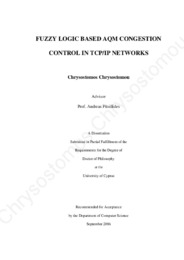Fuzzy logic based AQM conjestion control in TCP/IP networks: a dissertation

Ημερομηνία
2007-06Συγγραφέας
Chrysostomou, ChrysostomosΕκδότης
Πανεπιστήμιο Κύπρου, Σχολή Θετικών και Εφαρμοσμένων Επιστημών / University of Cyprus, Faculty of Pure and Applied SciencesPlace of publication
ΚύπροςCyprus
Google Scholar check
Keyword(s):
Metadata
Εμφάνιση πλήρους εγγραφήςΕπιτομή
Προτείνουμε μια συλλογή καινοτόμων μεθόδων για την εύρεση ομάδων σε ένα δίκτυο πληροφοριών που μοντελοποιείται ως ένας πολυγράφος ιδιοτήτων. Οι προτεινόμενες μέθοδοι μπορούν να εκμεταλλευτούν την υπολογιστική ισχύ των σύγχρονων πολυπύρηνων υπολογιστών έτσι ώστε να είναι ικανές να χειριστούν μεγάλα σύνολα δεδομένων. Προτείνουμε συναρτήσεις ενοποιημένης ομοιότητας ή απόστασης που συνδυάζουν αποτελεσματικά τα χαρακτηριστικά των κορυφών και σχεδιάζουμε μηχανισμούς στάθμισης. Οι προτεινόμενες μέθοδοι ομαδοποίησης προσδιορίζουν τη σημαντικότητα κάθε χαρακτηριστικού (ιδιότητας και τύπου ακμών) των αντικειμένων χρησιμοποιώντας αυτούς τους μηχανισμούς στάθμισης, και έτσι εξισορροπούν και συνδυάζουν αποτελεσματικά όλα τα χαρακτηριστικά των κορυφών. Το αποτέλεσμα είναι η βελτίωση της ποιότητας της ομαδοποίησης με βάση διάφορα ευρέως αποδεκτά μέτρα αξιολόγησης αλγορίθμων ομαδοποίησης. Ο στόχος μας είναι να μεγιστοποιήσουμε την ενοποιημένη ομοιότητα μεταξύ των κορυφών που ανήκουν στην ίδια ομάδα. Τα μέλη μιας ομάδας πρέπει να έχουν υψηλή παρόμοια συνδεσιμότητα (similar connectivity), δηλαδή να σχετίζονται/συνδέονται με τις ίδιες κορυφές. Επίσης, πρέπει να χαρακτηρίζονται από κοντινές τιμές ιδιοτήτων (χαμηλή εντροπία). Είμαστε από τους πρώτους που βρίσκουμε ομάδες με παρόμοια συνδεσιμότητα σε πολυγράφους ιδιοτήτων. Network management and control is a complex problem that requires robust, intelligent, control methodologies to obtain satisfactory performance. Active Queue Management (AQM) mechanisms have been introduced for router support to assist the TCP congestion control to perform satisfactorily in all circumstances. However, certain, well-known limitations, identified in the AQM literature, motivates the need to investigate alternative control techniques to control the time-varying dynamics, high variability, and nonlinearities of TCP/IP systems.
We present a new fuzzy logic based AQM control methodology to provide effective congestion control in TCP/IP networks. We adopt fuzzy logic due to its reported strength in controlling nonlinear systems using linguistic information. This methodology is developed to offer a simple and generic process, and thus it is adequately adopted in both best-effort and differentiated services (Diff-Serv) TCP/IP environments, providing acceptable quality of service (QoS).
The proposed fuzzy logic approach for congestion control allows the use of linguistic knowledge to capture the dynamics of nonlinear probability marking functions, and uses multiple inputs to capture the (dynamic) state of the network more accurately. The potential of Fuzzy logic control methodology to incorporate human knowledge into such a control strategy is demonstrated, and the capability to qualitatively capture the attributes of a control system based on observable phenomena is a main feature of fuzzy logic control and has been shown in the simulative evaluation.
We demonstrate through simulation evaluation, under widely differing operating conditions, that the fuzzy control methodology (for both best-effort and Diff-Serv environments) satisfies all the design requirements. It provides quality of service and high link utilization, with minimal losses, and bounded queue fluctuations and delays. In the framework of Diff-Serv, an adequate differentiation is further offered among different drop precedence’s traffic. The proposed fuzzy control methodology is shown to exhibit many desirable properties, like robustness and fast system response, with capabilities of adapting to highly variability and uncertainty in network, in contrast with other schemes compared with. It offers significant improvements in controlling congestion in TCP/IP networks, without the need for retuning.
